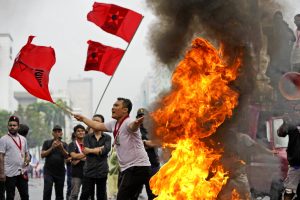Hundreds of students rallied in Indonesia’s capital and other cities for the fourth straight day yesterday to protest the sharp increases in fuel prices stemming from the reduction of a government fuel subsidy.
Prices of subsidized petrol and diesel jumped by about a third last weekend after Jokowi cut fuel subsidies in a bid to prevent a multi-billion-dollar budget overrun. This raised the price of subsidized petrol from 51 cents to 67 cents per liter and diesel from 35 cents to 46 cents – the first increase since 2014.
According to the Associated Press, protesters gathered yesterday at Monas, Jakarta’s National Monument, which commemorates the Indonesian struggle for independence. Some burnt tires, while others raised flags and unfurled banners reading, “We reject the fuel price hikes.”
For months President Joko “Jokowi” Widodo’s administration has spent billions of dollars shielding the Indonesian public from the rising prices of oil, cooking oil, and other basic goods – a result of rising global oil prices and the weakening of the Indonesian rupiah. But Jokowi stated last month that as a result, the government had raised the state budget allocation for subsidies from 152 trillion rupiah ($10.2 billion) to 502 trillion rupiah ($33.8 billion).
As expected, the move immediately touched off protests, which have been held in cities across Indonesia by students, workers, farmers, fishermen, and teachers. The protesters claim that the hike in fuel prices will hit a lot of ordinary people, already reeling from inflation and the economic aftershocks of the COVID-19 pandemic.
Reporting on a protest on September 6, Reuters reporter Stanley Widianto observed a shirtless demonstrator “with feet shackled to an empty petrol tank, carrying a sign highlighting the hardship brought by rising costs.” According to The Associated Press, Said Iqbal, the president of the Confederation of Indonesian Trade Unions, said that workers are planning more rallies and considering a national strike unless the fuel increase is rescinded.
While the protests remain relatively contained so far, they speak to the political sensitivities associated with the rising prices of essential goods. A commitment to keep the costs of these items in check has long been a basic part of the Indonesian social contract – one that has seen the government intervene in various ways in the workings of the market. As I noted last week, the government has recently taken steps to control the cost of cooking oil, amid the spiraling prices brought about by the Russia-Ukraine war (these also prompted protests), and electricity, by restricting exports of coal to ensure ample supplies for domestic power generation.
Jokowi’s administration is in a good position to weather the political storm. The president is nearing the end of his second and last term in office, and controls a big tent parliamentary coalition that includes most of the country’s largest political parties. It has also promised to offer direct cash transfers and other forms of compensation to 20 million needy households, in order to offset the rising costs of fuel and the possible knock-on inflation in other parts of the economy.

































